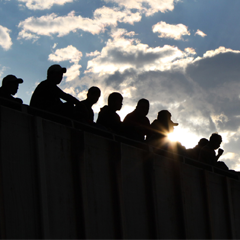[19 December 2016] -- The USA-Mexico corridor is the most dynamic and complex in the world. Each year, thousands of people travel the corridor seeking work, a better quality of life, family reunification, or escape from violence. Central America in particular is a region of origin, transit, destiny and return for many of these migrants; almost three million Central American residents live in the USA, two thirds from Guatemala and El Salvador.
In recent years, deportation rates from the U.S. to Guatemala, El Salvador and Honduras have increased due to anti-migrant legislation. In 2014, U.S. Immigration and Customs Enforcement (ICE) deported 315, 943 migrants (56% from Mexico and 39% from Central America).
Many of the deported migrants are young Guatemalans from secondary cities such as San Marcos, Quiché, and Quetzaltenango. When they are deported, however, they often end up in Guatemala City, which receives almost 100,000 deportees each year. The city lacks the capability to generate the necessary opportunities for social inclusion for the deportees and many have no source of economic income, resulting in an increase in encampments and precarious living conditions. For many of these people, the only alternative is to migrate once again.
The government of Guatemala has struggled to generate enough work-related opportunities for deportees, and support for them upon arrival is limited. There is a missed opportunity to integrate productive human resources that could actively contribute to the city’s economy.
Creating opportunities for deported migrants
With support from Cities Alliance Catalytic Fund, the Fundación Avina has initiated a project to help integrate deported migrants into the labour market and local economy in Guatemala: Integración de los migrantes en el mercado laboral y la economía local de las ciudades del Departamento de Guatemala.
The project will establish an Intersectoral Committee for Labour and Social Inclusion, one of the first initiatives of its kind in the country. The committee will bring together representatives from different sectors who are directly related to migration and social inclusion, including the public and private sectors, academia, and civil society. The idea is for all parties to become aware of the existing local programmes and initiatives so they can join efforts and achieve more effective results. The committee also aims to encourage public institutions and private companies to allot funding to support the project’s objectives.
The project also includes:
-- Psychosocial support to help the deportees cope with the trauma of their experiences;
Training on forming technical, financial, political and trade unions; and
-- Training to complement competencies migrants have acquired abroad as well as access to job opportunities and entrepreneurship projects.
Avina will also coordinate with other organisations to benefit the project. The foundation will work with the National Center for Social Responsible Businesses (Centro Nacional para la Responsabilidad Social Empresarial-Centrarse), a group of approximately 120 businesses that has managed a programme called “Inclusive Businesses” to promote businesses that are free of discriminatory practices. Avina will also work closely with Habitat for Humanity Guatemala. Their social housing programmes aim to improve the quality of life for many low-income families, and construction of these housing units can provide jobs for up to 150 deportees.
These partnerships will set a precedent for how programmes can leverage impact to address adverse conditions faced by vulnerable communities and improve the quality of life in Guatemala City. The activity is expected to create employment and provide access to housing, which in turn will help families gain access to services including sanitation, water and electricity.
In keeping with the goals of the Cities Alliance Catalytic Fund, knowledge sharing is an important part of this activity. Lessons learned will be shared with neighbouring countries such as Honduras and El Salvador to gather ideas on scaling up the project with public officials, private sector and other stakeholders.
About Fundacion Avina
Avina is an international non-profit organisation with 22 years of experience operating in 21 Latin American countries (www.avina.net). Avina’s mission is to impact sustainable development in Latin America by creating favourable conditions for diverse actors to join forces in contributing to the common good. Avina promotes social inclusion and equality for all marginalised groups, especially women, informal recyclers, community water leaders, and migrants.
The Cities Alliance project will be part of the Regional Migration Programme of Fundación Avina´s overall labour agenda. Avina also participates in an innovative collaboration between cooperatives called Central America and Mexico Migration Alliance (Alianza para las Migraciones en Centro América y México-CAMMINA). This initiative was founded by Fundación Avina, Ford Foundation and Open Society Foundations, which all came together to launch and support innovative processes in the areas of human rights and local economic development in migrant communities.
CAMMINA has supported national public policies, international migration and new approaches to justice and development. With investments of USD 10 million over the past four years, CAMMINA has strengthened more than 100 migrant and civil society organisations and developed innovative policies affecting millions of migrants.

In recent years, deportation rates from the U.S. to Guatemala, El Salvador and Honduras have increased due to anti-migrant legislation.Photo: Vanessa García Blanca
The activity establishes partnerships that will set a precedent for how programmes can leverage impact to address adverse conditions faced by vulnerable communities and improve the quality of life in Guatemala City.
Related Items:
Cities Alliance Catalytic Fund




